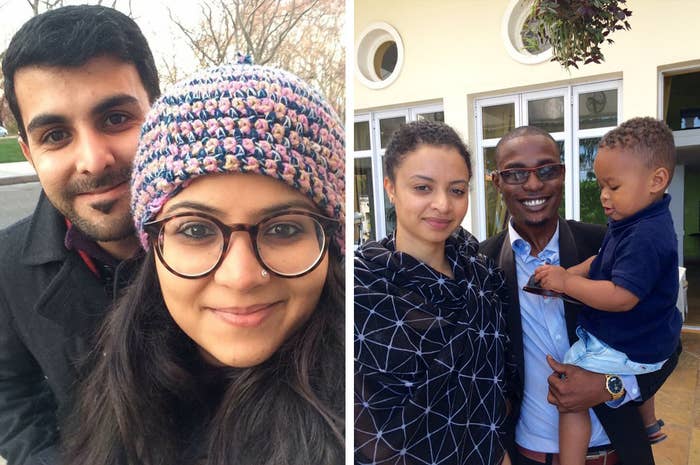
The Supreme Court has ruled that it is legal for the government to keep non-EU spouses out of the UK if their British partner does not meet minimum earnings. But the ruling held out hope for families with children separated by the policy.
Thousands of couples were waiting on the ruling in the hope that they would at last be able to live together in Britain. Most will be left disappointed.
Theresa May introduced the rule change in 2012 as home secretary. It means British citizens must earn at least £18,600 a year to bring in a non-EU spouse.
The Home Office has suspended applications from couples who do not meet the minimum income threshold while they consider the issues raised by the case.
The Supreme Court acknowledged the impact of the policy on couples but said: "The fact that [the income rule] may cause hardship to many does not render it unlawful."
The inflexibility of the income threshold was also questioned by judges. They ruled that where the minimum income requirement is not met, further consideration should be given to alternative sources of income when considering whether a visa should be granted outside of the rules.
Families who have fallen short of the earnings have the best chance of being reunited following the court decision. The judges ruled that current instructions for enforcing the law when children are involved were “defective and need to be amended” in line with human rights law. They added: “In this respect the Supreme Court grants a declaration that the Rules and the Instructions are unlawful.”
Saira Grant, chief executive of the Joint Council for the Welfare of Immigrants, said: “This judgment is a real victory for families especially those with children. For five years JCWI has been working with affected families and has been trying to persuade the government to abandon the Family Migration Rules it introduced in 2012 because they are tearing families apart and significantly harming children."
She added: "These are significant victories for families up and down the country. This judgment confirms that the government’s position is now untenable and they must now take immediate steps to protect the welfare of children in accordance with their legal duty.”
The European Committee of Social Rights said in 2015 that the UK was not conforming with its EU obligations because “the income requirement for migrants who wish their families to join them is too high and is likely to hinder family reunion”.
Sonel Mehta, founder of BritCits, which campaigned on behalf of families divided by the policy, said: “It is disappointing that the Supreme Court acknowledges 301 out of 422 listed occupations earn on average less than the MIR, and often these are 'providing essential public services’ yet go on to uphold a MIR which is around 50% higher than what a full-time worker earning the minimum wage could earn.”
She added: “But it’s not all doom and gloom. The appalling way this government has treated kids has not been lost on the Court, and alternative means of funding also now need to be taken into account. What this means for families though will be clearer only when we see how the government implements the required changes as they seem to have been afforded quite a bit of leeway on how they will do so.”
A Home Office spokesman said: “The Court has endorsed our approach in setting an income threshold for family migration that prevents burdens on the taxpayer and ensures migrant families can integrate into our communities. This is central to building an immigration system that works in the national interest.
“The current rules remain in force but we are carefully considering what the Court has said in relation to exceptional cases where the income threshold has not been met, particularly where the case involves a child.”
It has taken the Supreme Court more than a year to reach the decision on whether this is unlawful.
This is a developing story.
